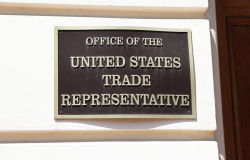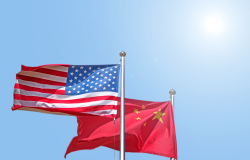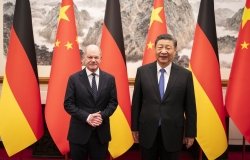Women and Entrepreneurship: Perspectives from the Middle East and the United States
A group of American and Middle Eastern businesswomen discussed their common challenges and rewards in running their own companies and the resources available for women entrepreneurs.
Overview
On March 29, the Middle East Program, Program on America and the Global Economy, and United States Studies hosted "Women and Entrepreneurship: Perspectives from the Middle East and the United States." A group of American and Middle Eastern businesswomen discussed their common challenges and rewards in running their own companies and the resources available for women entrepreneurs. Panelists included Tami Longaberger, CEO, The Longaberger Company; Hanan Saab, Founder and Managing Director, Pharmamed; Lina Hundaileh, Chairman and CEO, Printing for the Manufacturing of Chocolate; Elizabeth Vazquez, CEO, WEConnect International; Laila Iskandar, Chairperson, CID Consulting, Egypt; Mary Moorhouse, Director Special Projects, Business and Professional Women's Foundation; and Noora Al Mannai, Deputy Project Director, Enterprise Qatar.
Mark Doms, Chief Economist, U.S. Department of Commerce, provided the opening remarks for the meeting. Haleh Esfandiari, Director, Middle East Program, Woodrow Wilson Center provided introductory remarks, and Longaberger offered concluding thoughts. Amy Wilkinson, Public Policy Scholar, Woodrow Wilson Center and Senior Fellow, Center for Business and Government, Harvard University, and Sonya Michel, Director, United States Studies, Woodrow Wilson Center, served as moderators. In a roundtable working luncheon immediately following the meeting, Jane Harman, Director, President, and CEO of the Woodrow Wilson Center, and Nadereh Chamlou, Senior Advisor, Office of the Chief Economist, Middle East and North Africa Region, World Bank, joined the participants to offer their perspectives on the topic.

Doms presented the findings of two recent Department of Commerce reports on women-owned businesses (WOBs) as well as the economic and social well-being of women in America. According to these studies, the number of WOBs has increased over the past few decades but remains well below the number of men-owned businesses, and self-employed women earn significantly less than self-employed men. Education rates, however, have changed dramatically, and Doms said women are now more likely than men to graduate from college and to attend two or more years of graduate school. Progress has been made, he concluded, but we still have a long way to go before achieving gender equity in the economic sphere.
 The first panel featured businesswomen from the United States, Lebanon, and Jordan who discussed the obstacles and advantages to being a woman entrepreneur. Longaberger spoke about transforming her father's basket manufacturing business into a large direct-sales company which, she said, is now "in the business of really providing opportunities for women." The direct-sales model, she pointed out, allowed women to overcome some of the significant obstacles to entrepreneurship by providing a supportive and flexible environment distinct from mainstream corporate culture. Longaberger also noted that direct selling offers a good cultural fit for Middle Eastern societies, helping women become "micro-entrepreneurs" in spite of limited access to the male dominated labor force.
The first panel featured businesswomen from the United States, Lebanon, and Jordan who discussed the obstacles and advantages to being a woman entrepreneur. Longaberger spoke about transforming her father's basket manufacturing business into a large direct-sales company which, she said, is now "in the business of really providing opportunities for women." The direct-sales model, she pointed out, allowed women to overcome some of the significant obstacles to entrepreneurship by providing a supportive and flexible environment distinct from mainstream corporate culture. Longaberger also noted that direct selling offers a good cultural fit for Middle Eastern societies, helping women become "micro-entrepreneurs" in spite of limited access to the male dominated labor force.
 Saab, a pharmacist by training who founded a Lebanese pharmaceutical and medical supply company, spoke of cultural, financial, and institutional barriers to women entrepreneurship in the Middle East. She emphasized the importance of perseverance and strong personal convictions in overcoming obstacles ranging from restrictive loaning systems to family obligations to widespread corruption. She also pointed to the importance of mentoring and suggested reforms that would create a more conducive environment for women entrepreneurs in the Middle East. Saab predicted that greater participation of women in business would come only with improved governance, equity in taxation, and the assistance of civil society organizations such as the Lebanese League for Women in Business, of which she is a founding member and current president.
Saab, a pharmacist by training who founded a Lebanese pharmaceutical and medical supply company, spoke of cultural, financial, and institutional barriers to women entrepreneurship in the Middle East. She emphasized the importance of perseverance and strong personal convictions in overcoming obstacles ranging from restrictive loaning systems to family obligations to widespread corruption. She also pointed to the importance of mentoring and suggested reforms that would create a more conducive environment for women entrepreneurs in the Middle East. Saab predicted that greater participation of women in business would come only with improved governance, equity in taxation, and the assistance of civil society organizations such as the Lebanese League for Women in Business, of which she is a founding member and current president.

Hundaileh echoed the panel's conclusions about the determination required of businesswomen in the Middle East. Sensing a market for high quality chocolate in Jordan, Hundaileh educated herself about the industry to impress potential investing partners who were initially skeptical of working with a female entrepreneur. She also emphasized the importance of innovation, creativity, and the ability to tailor solutions to the unique realities of a given market to compete successfully with foreign corporations. These lessons, she said, were essential in educating the next generation of women entrepreneurs and promoting increased engagement of women in civil society.
 Participants in the second panel discussed resources for women entrepreneurs. Vazquez, whose organization, WEConnect, seeks to improve women's access to knowledge, networks and markets, suggested that women use their purchasing power to promote positive change. Given that women make 85 percent of consumer decisions at the household level, Vazquez explained, thoughtful use of this power could support existing WOBs and encourage the growth of new ones. She also noted that the U.S. government has yet to meet its annual goal of purchasing 5 percent of its supplies from women, which would provide WOBs with billions of extra dollars per year.
Participants in the second panel discussed resources for women entrepreneurs. Vazquez, whose organization, WEConnect, seeks to improve women's access to knowledge, networks and markets, suggested that women use their purchasing power to promote positive change. Given that women make 85 percent of consumer decisions at the household level, Vazquez explained, thoughtful use of this power could support existing WOBs and encourage the growth of new ones. She also noted that the U.S. government has yet to meet its annual goal of purchasing 5 percent of its supplies from women, which would provide WOBs with billions of extra dollars per year.
 Iskandar, who began a social enterprise network for women in the impoverished garbage collectors' neighborhoods of Cairo, spoke to the necessity of shifting perceptions to find resources in unlikely places. For Iskandar and the women with whom she works, "waste" provides both jobs and valuable materials to be collected, sorted, and recycled or exported. She emphasized that each woman in this network is a kind of micro-entrepreneur, and by uniting they can speak with one voice to effect policy change.
Iskandar, who began a social enterprise network for women in the impoverished garbage collectors' neighborhoods of Cairo, spoke to the necessity of shifting perceptions to find resources in unlikely places. For Iskandar and the women with whom she works, "waste" provides both jobs and valuable materials to be collected, sorted, and recycled or exported. She emphasized that each woman in this network is a kind of micro-entrepreneur, and by uniting they can speak with one voice to effect policy change.
With the Business and Professional Women's Foundation, Moorhouse seeks to advance women's needs in the workforce. One strategy is to educate companies about creating secure workplaces for women and informing "target groups" such as older women or female veterans about their rights and opportunities in the economic sector. She suggested that more flexible lending practices, increased government investment in WOBs, and mentoring could alleviate the obstacles now keeping many women out of the business world.
Al-Mannai discussed her experience as an entrepreneur in Qatar, where she has opened three separate businesses. In her current position with Enterprise Qatar, she helps promote women's entrepreneurship by providing four key resources: 1) funding, 2) business support services such as mentoring and managerial advising, 3) training and development programs, and 4) policy advocacy at the local, regional, and international levels. Al-Mannai mentioned that cultural norms, rather than lack of resources or education, presented the greatest obstacles for women entrepreneurs in Qatar.
Longaberger, who is also chair of the Arab Women's Leadership Institute in Amman, Jordan, concluded the program by extolling the ability of women to make a difference through their passion and entrepreneurial spirit. While noting that the Middle East, has the lowest percentage of economically active women in the world, she lauded the great strides women in the region have made over the past few decades in coming together and capitalizing on opportunities.
Following the public meeting, Chamlou began the roundtable discussion by commenting on women's capacity to contribute to a brighter future. She summarized key points from the panel discussions and led the group in identifying best practices and formulating specific next steps by examining what policies are needed and determining which actors are best positioned to implement them. Several women deplored the lack of women's voices in politics, but Saab pointed out that the best way for women to gain political power was by developing their economic potential. Harman agreed that economic participation has the capacity to empower women, and she hoped that women will play a major role in shaping the transformations currently occurring in the Middle East.
By Abby Arganese, Middle East Program; and Andrew Bedell, US Studies Program
Documents & Downloads
- Women and Entrepreneurship: Perspectives from the Middle East and the United StatesDownload
- Women and Entrepreneurship: Perspectives from the Middle East and the United StatesDownload
- Women and Entrepreneurship: Perspectives from the Middle East and the United StatesDownload
- Women and Entrepreneurship: Perspectives from the Middle East and the United StatesDownload
- Women and Entrepreneurship: Perspectives from the Middle East and the United StatesDownload
Speakers
Tami Longaberger
Chair of the Board, The Longaberger Family Foundation
Hanan Saab
Lina Hundaileh
Elizabeth Vazquez
Laila Iskandar
Mary Moorhouse
Noora Al Mannai
Mark Doms

Haleh Esfandiari
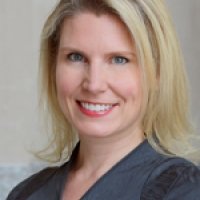
Amy Wilkinson
Senior Fellow, Center for Public Leadership, Harvard University
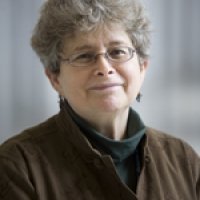
Sonya Michel, PhD
Professor Emerita, History and Women's and Gender Studies, University of Maryland
Hosted By

Middle East Program
The Wilson Center’s Middle East Program serves as a crucial resource for the policymaking community and beyond, providing analyses and research that helps inform US foreign policymaking, stimulates public debate, and expands knowledge about issues in the wider Middle East and North Africa (MENA) region. Read more

Environmental Change and Security Program
The Environmental Change and Security Program (ECSP) explores the connections between environmental change, health, and population dynamics and their links to conflict, human insecurity, and foreign policy. Read more
Thank you for your interest in this event. Please send any feedback or questions to our Events staff.

